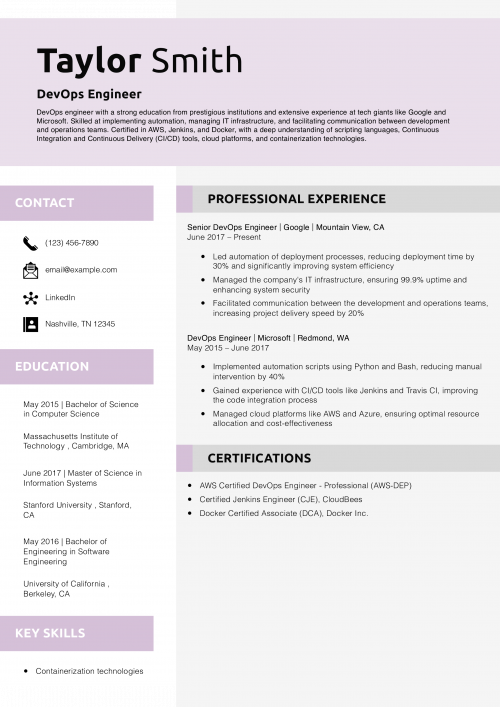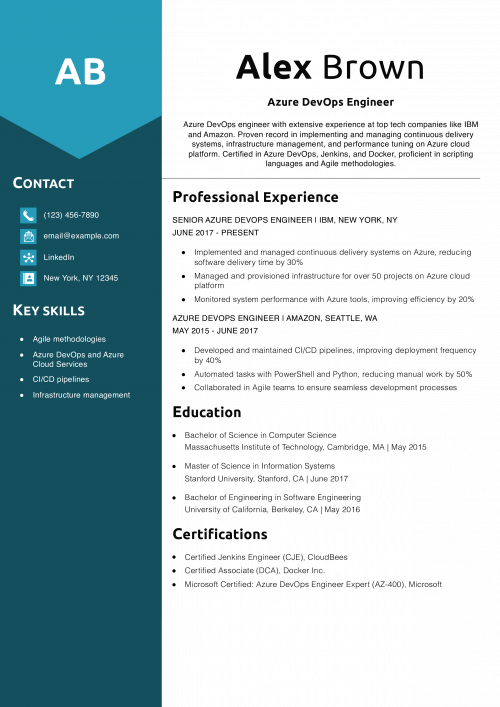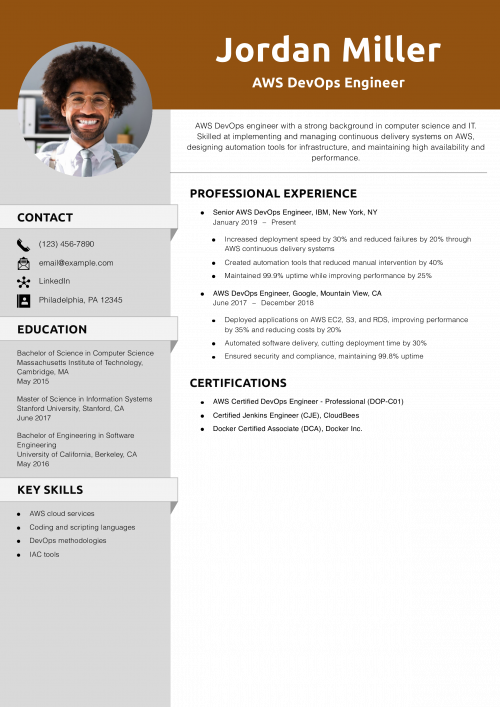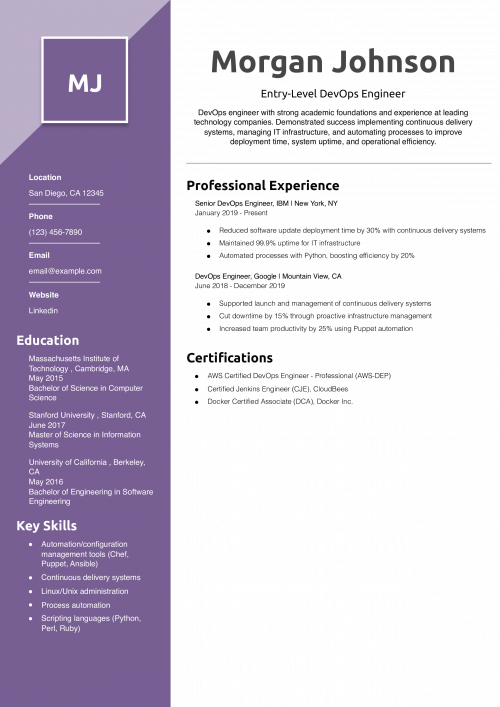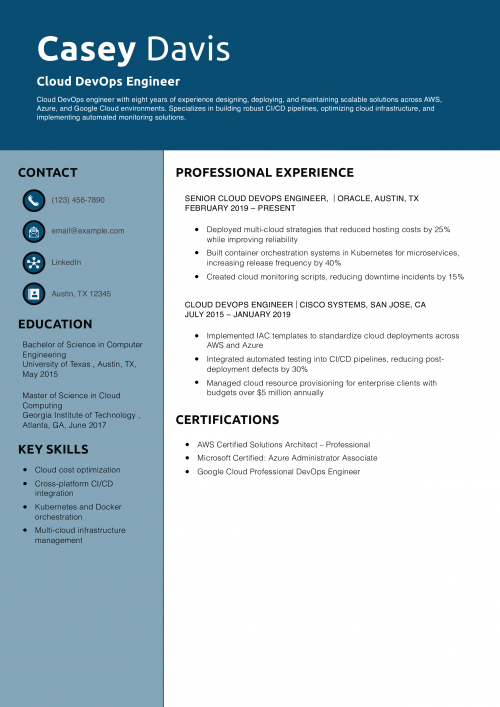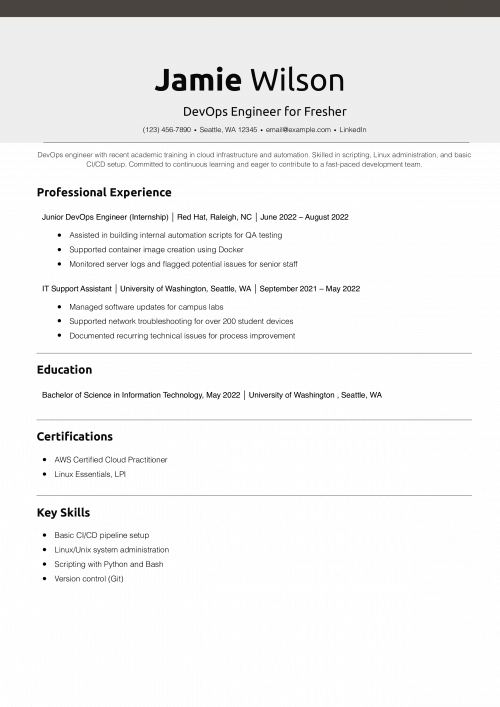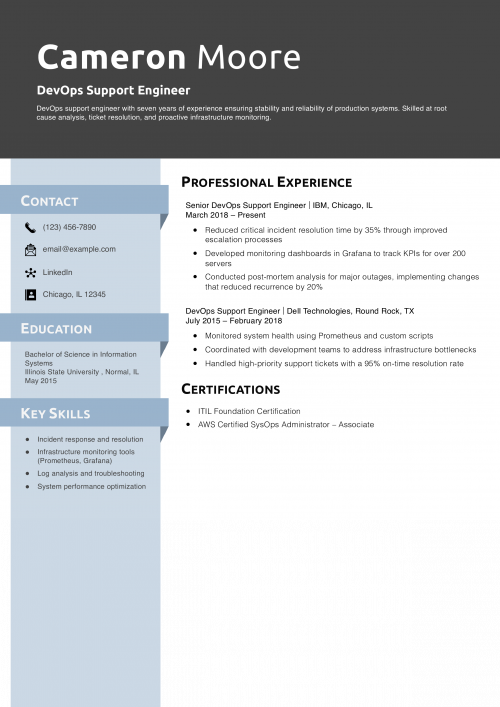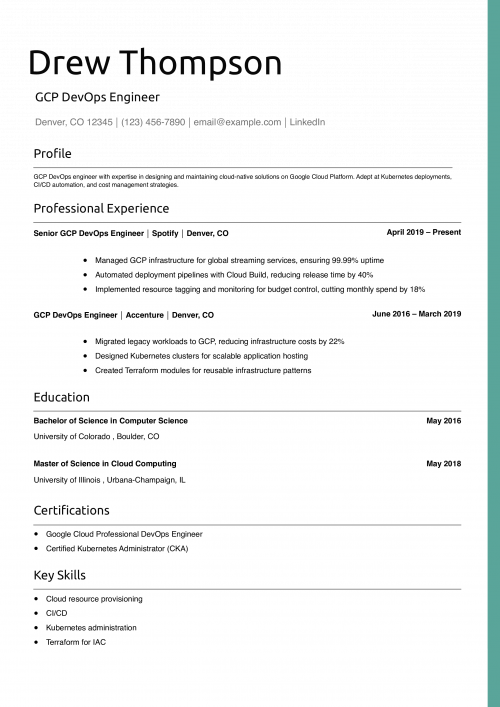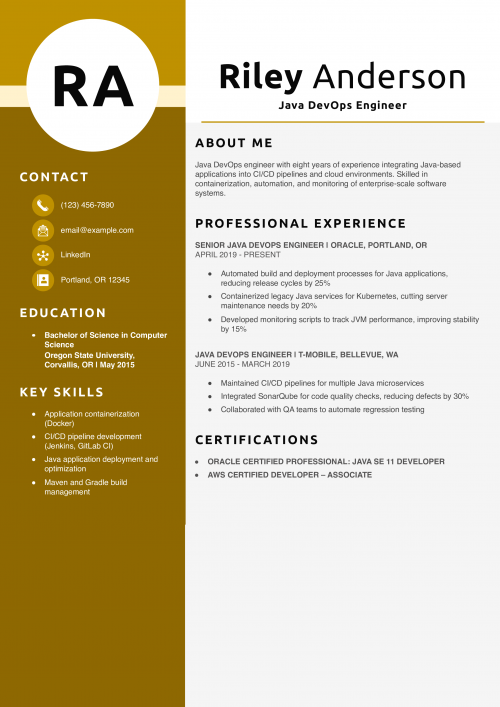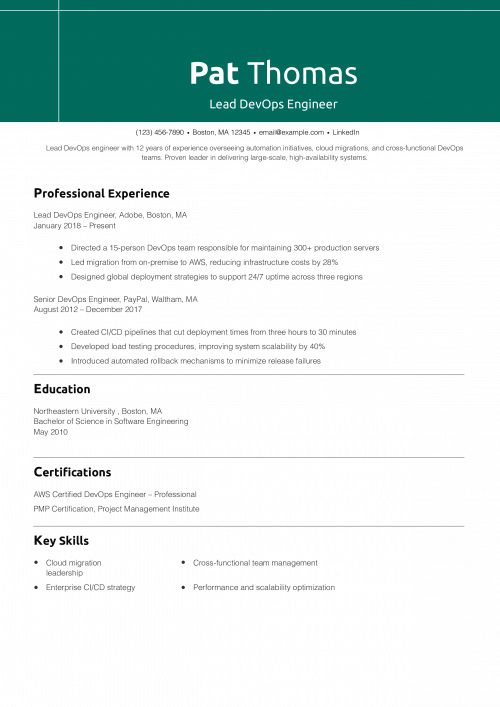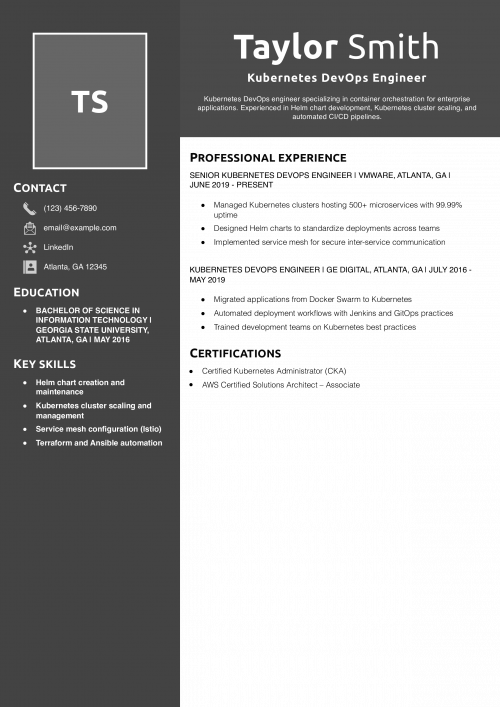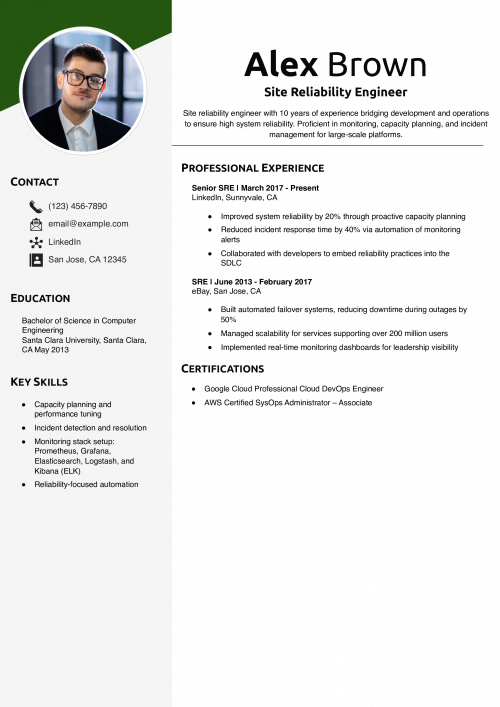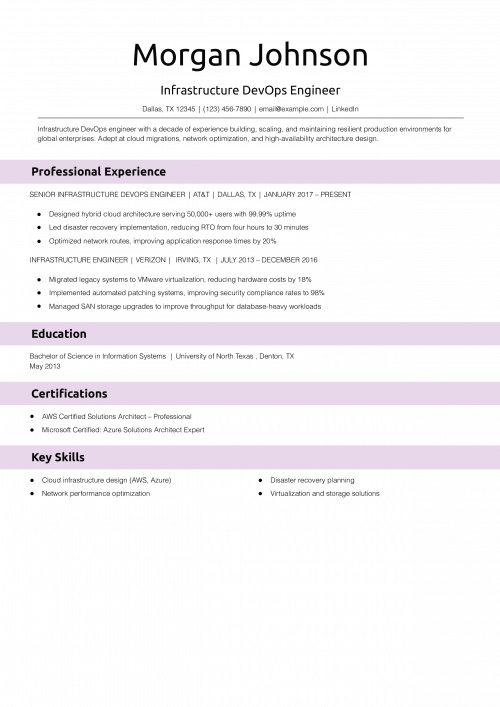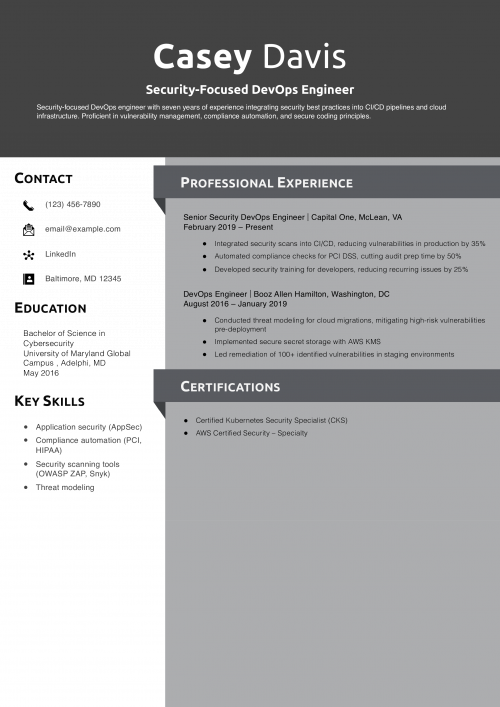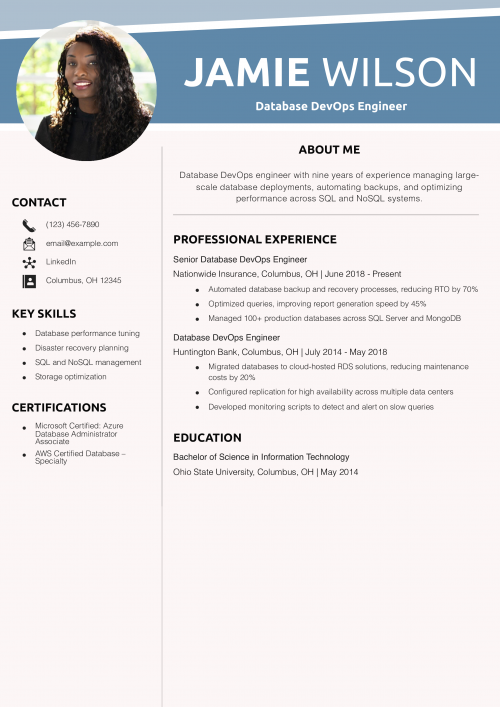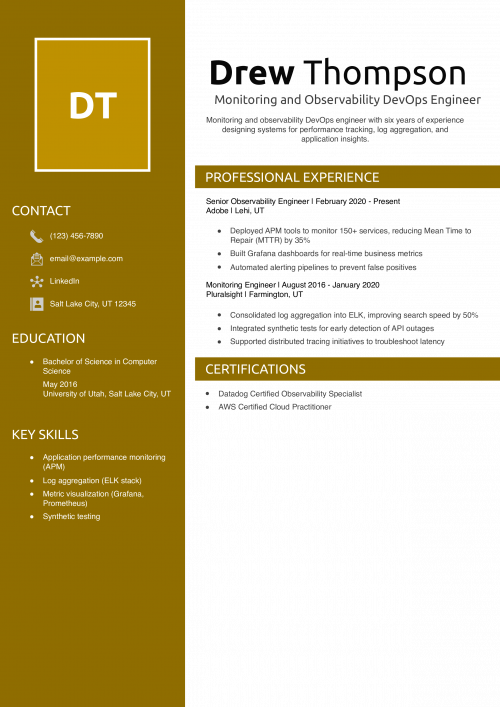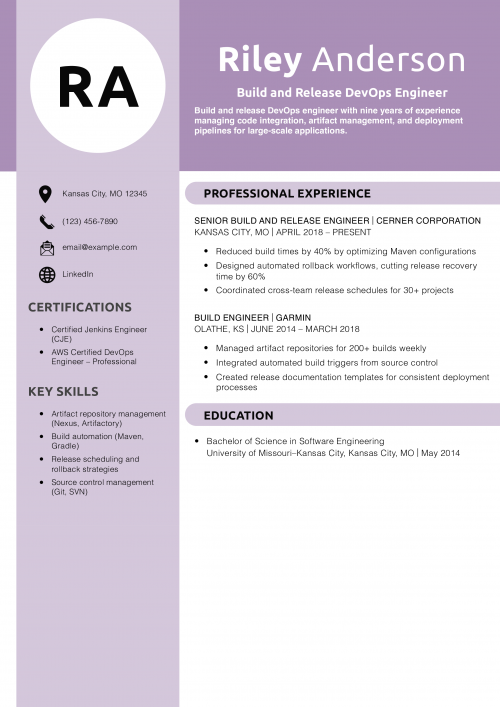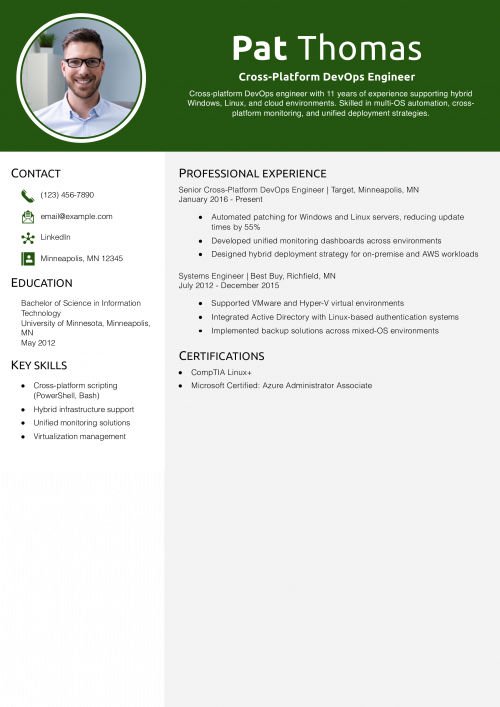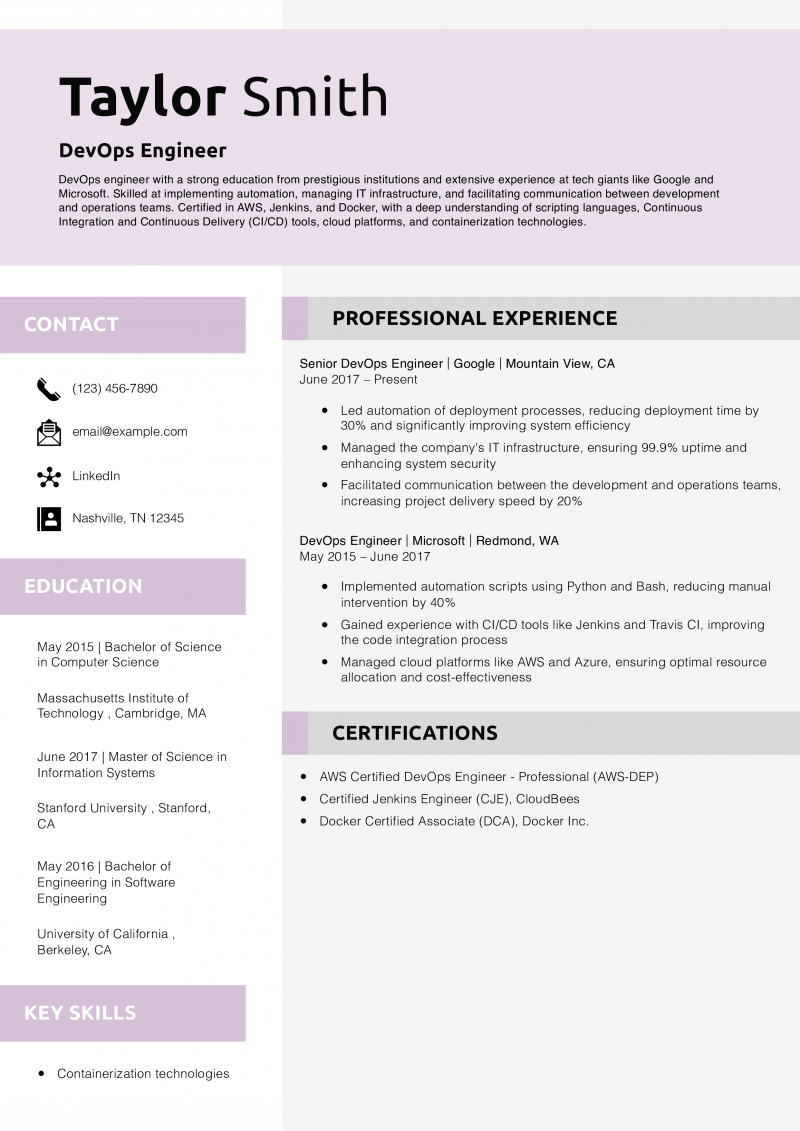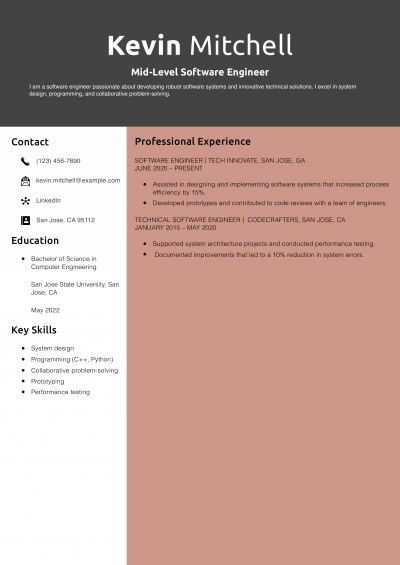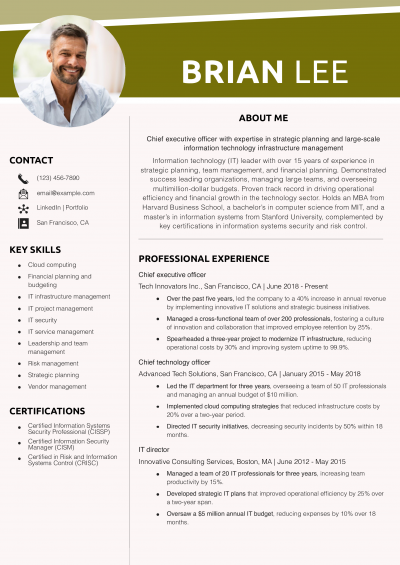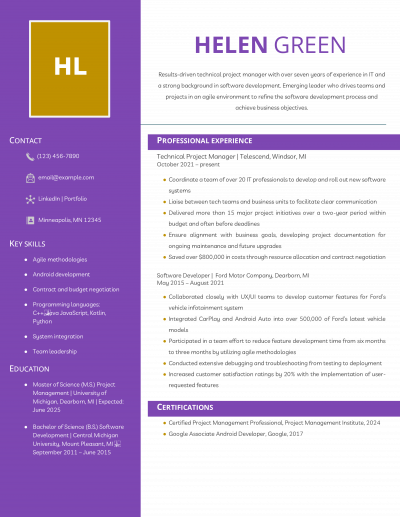A good development and operations (DevOps) engineer resume focuses on your relevant skills like process automation, infrastructure management, or cross-team collaboration. Give examples of your success as a DevOps engineer or in similar roles, and show your knowledge base by citing any technical training or certificate programs you’ve done. This guide provides expert tips to help you create a results-driven resume showing your best DevOps engineer qualifications.
Key takeaways:
- Brainstorm details about your work history on a separate document or sheet of paper. Then, identify the most relevant ones to feature in your experience section – this helps you focus your resume so it positions you for the role of DevOps engineer.
- Use bullet points to display your achievements. Start each bullet point with a strong verb like “Created” or “Enhanced.”
- Spell out the results of your past work as a DevOps engineer. Describe how your efforts helped the wider organization achieve its goals.
Most Popular DevOps Engineer Resumes
DevOps Engineer Resume Example
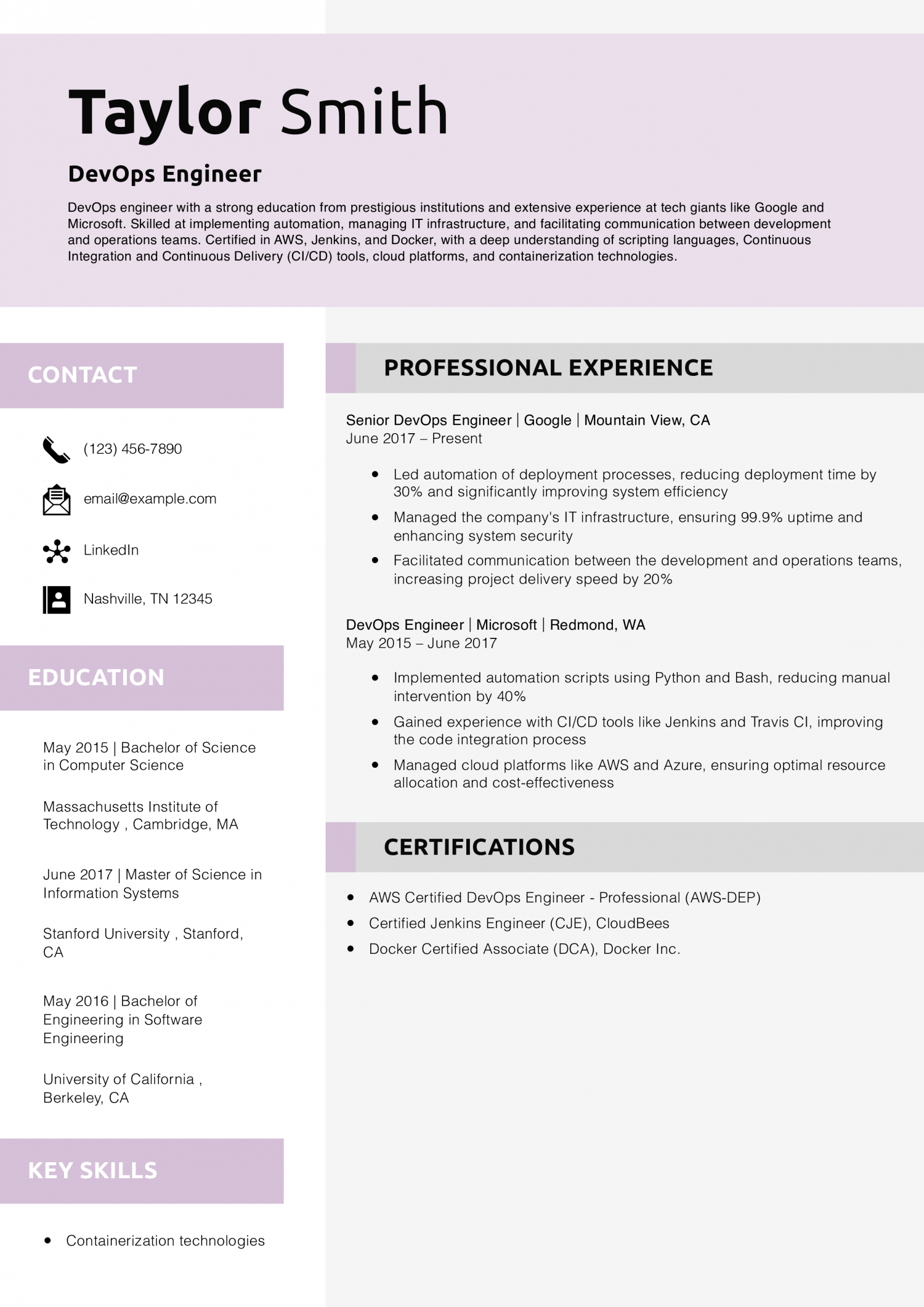
Why this DevOps engineer resume example is strong:
Taylor’s resume uses a clear reverse-chronological format, putting their most relevant and recent work at the top. The bullet points quantify improvements, such as deployment time reductions and uptime percentages, which help hiring managers visualize impact. The balanced mix of certifications, top-tier education, and technical expertise makes this a compelling example. For more guidance on structuring your own resume, see Best Resume Formats.
Azure DevOps Engineer Resume Example
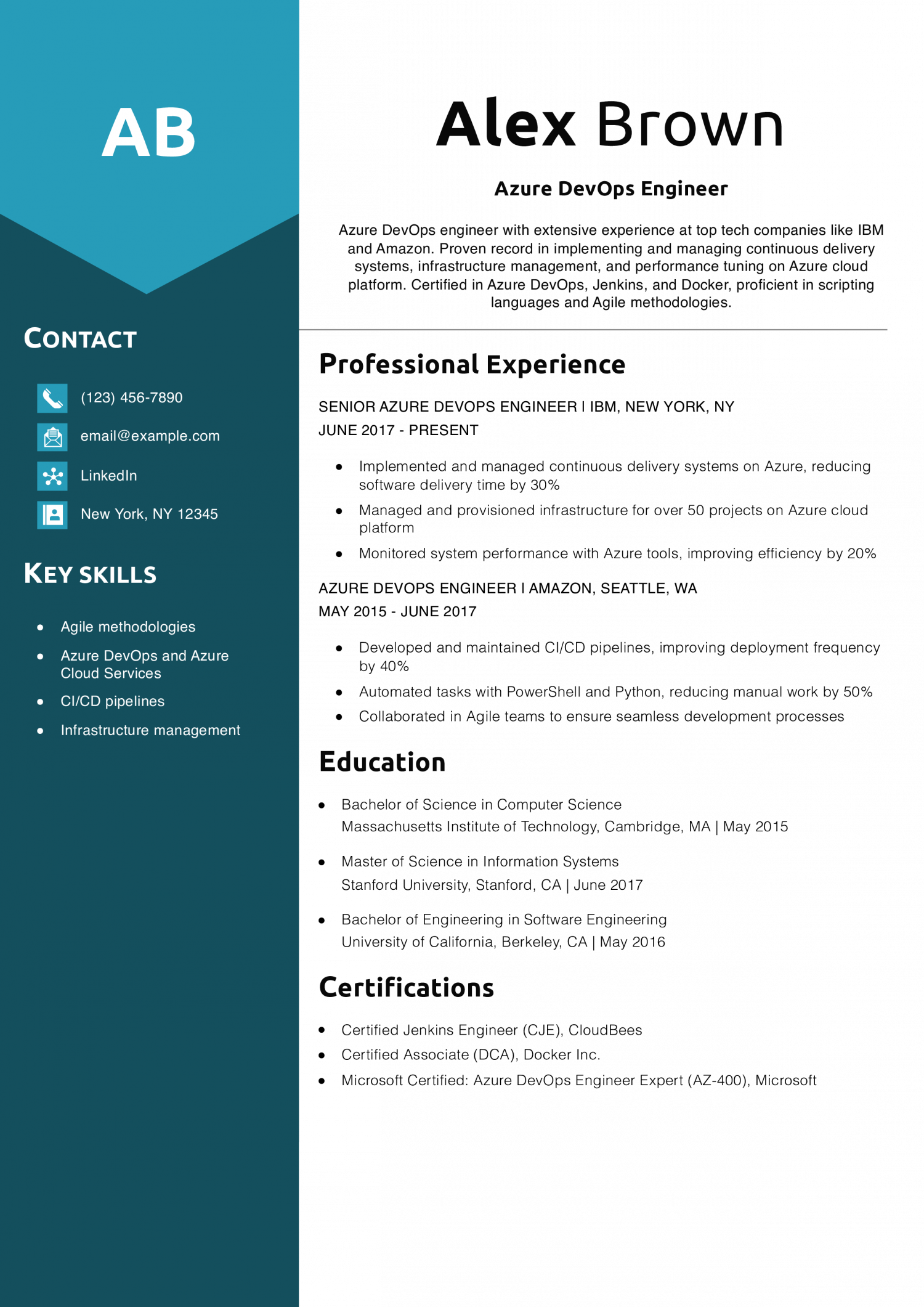
Why this Azure DevOps engineer resume example is strong:
Alex’s resume uses concise, impactful bullet points that emphasize measurable results like improved deployment frequency and reduced manual work. Their skills section is tailored to Azure-specific capabilities, reinforcing their fit for cloud-focused roles. Learn more about crafting tailored skill lists in Skills To Put on a Resume.
AWS DevOps Engineer Resume Example
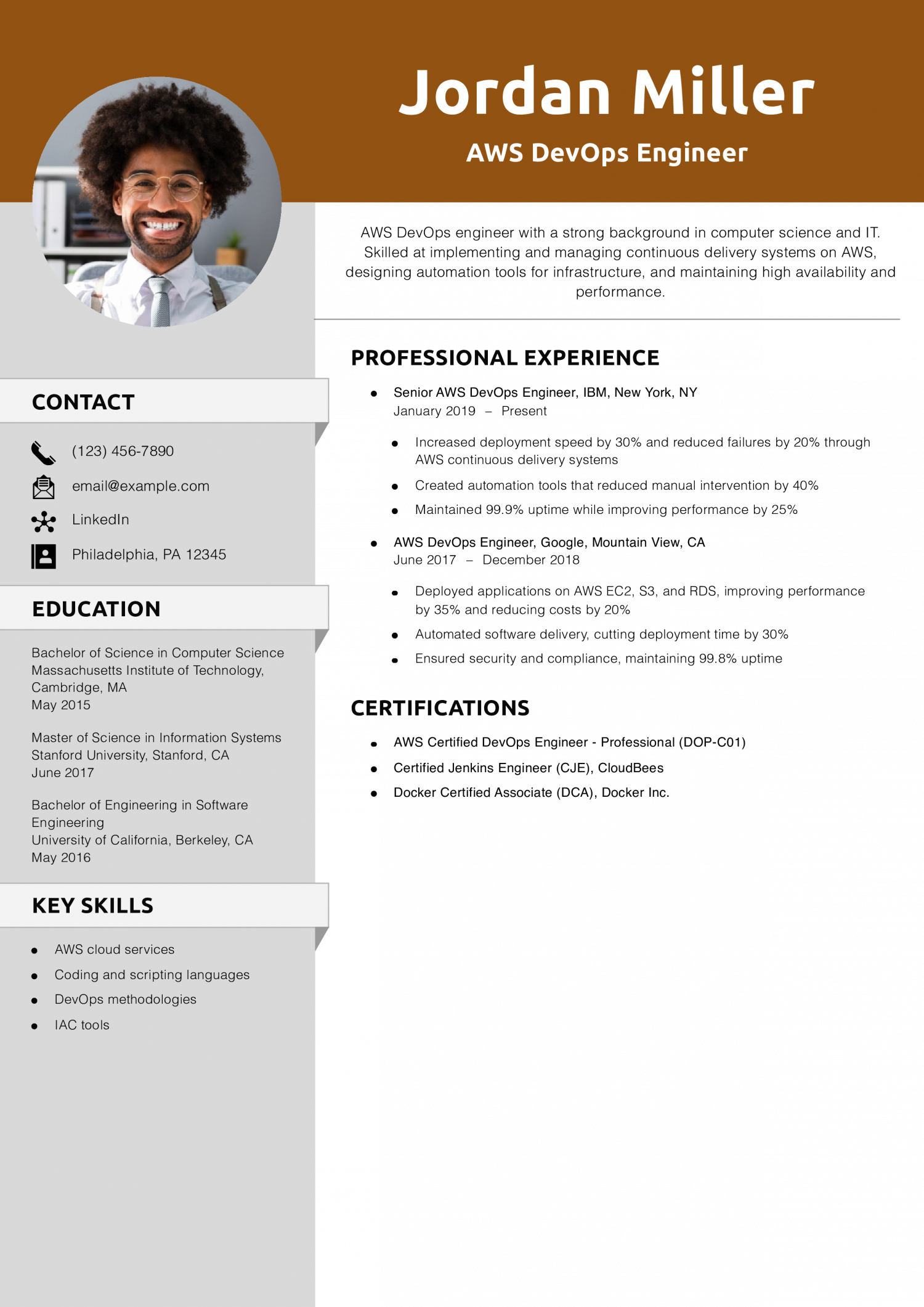
Why this AWS DevOps engineer resume example is strong:
Jordan’s resume showcases concrete results for each role, using metrics to illustrate efficiency gains, uptime improvements, and cost savings. The AWS-specific achievements demonstrate direct relevance to cloud-based hiring needs. To better highlight your own accomplishments, explore How To Make a Resume.
Entry-Level DevOps Engineer Resume Example
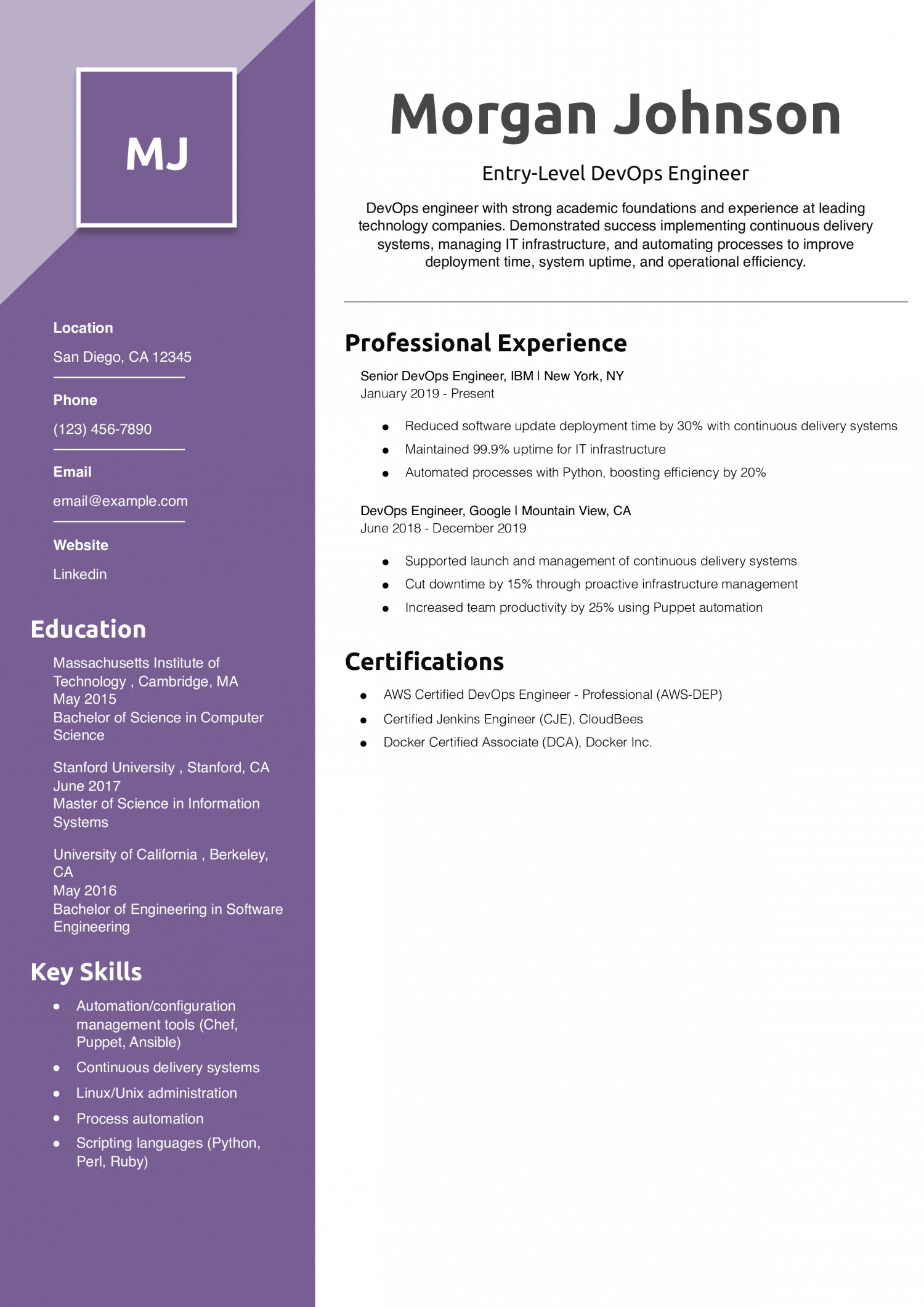
Why this entry-level DevOps engineer resume example is strong:
Morgan’s resume strongly uses a skills section to show relevant tools and technologies immediately. For those new to the field, listing key capabilities prominently helps demonstrate readiness to contribute. To learn how to create a strong summary for your own resume, see How To Write a Resume Summary.
Cloud DevOps Engineer Resume Example
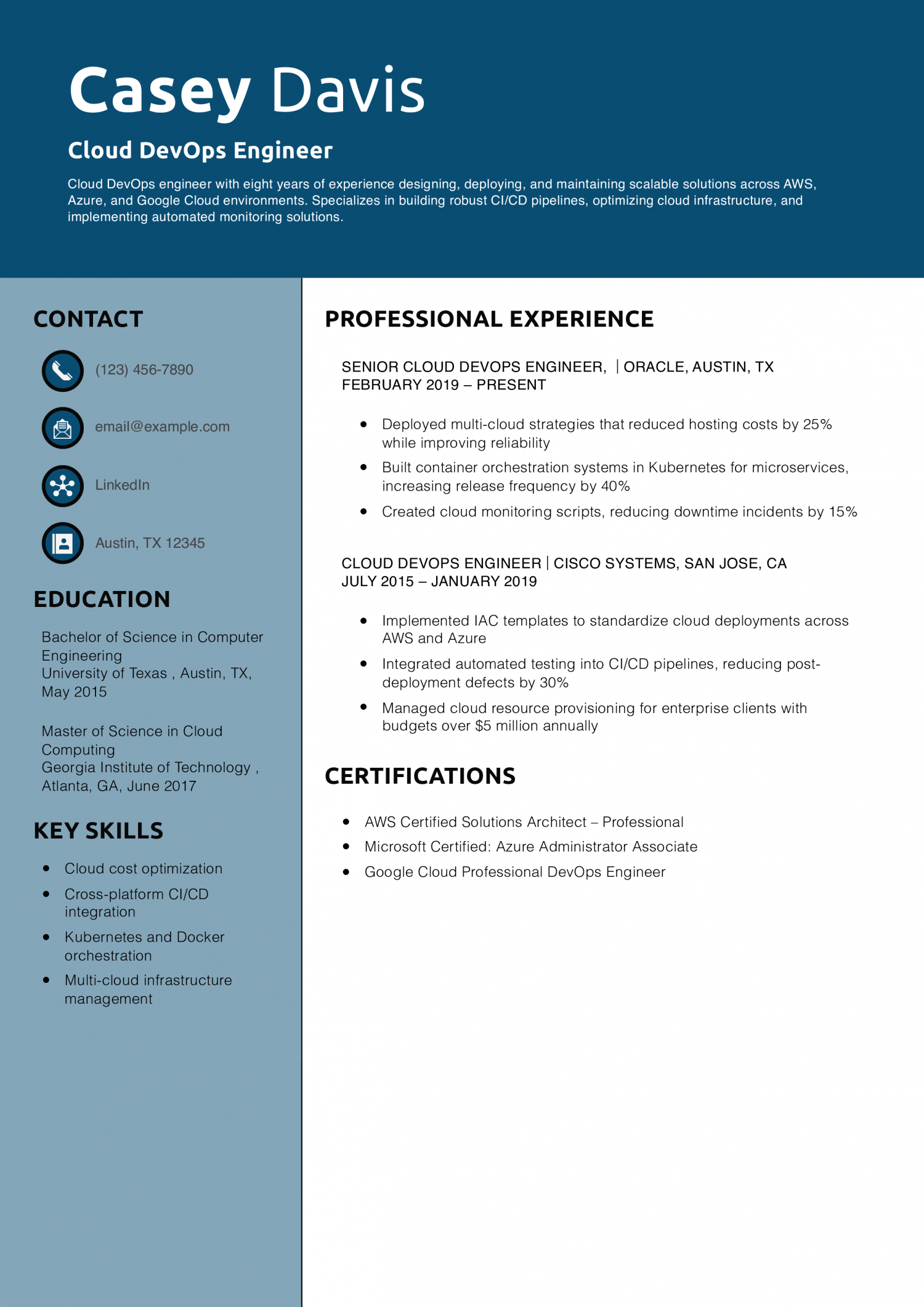
Why this cloud DevOps engineer resume example is strong:
Casey’s resume highlights their ability to manage multi-cloud systems and reduce operational costs through strategic deployments. Quantified improvements in cost savings and uptime make the achievements stand out. For help deciding what details to include, see What To Put on a Resume.
DevOps Engineer for Fresher Resume Example
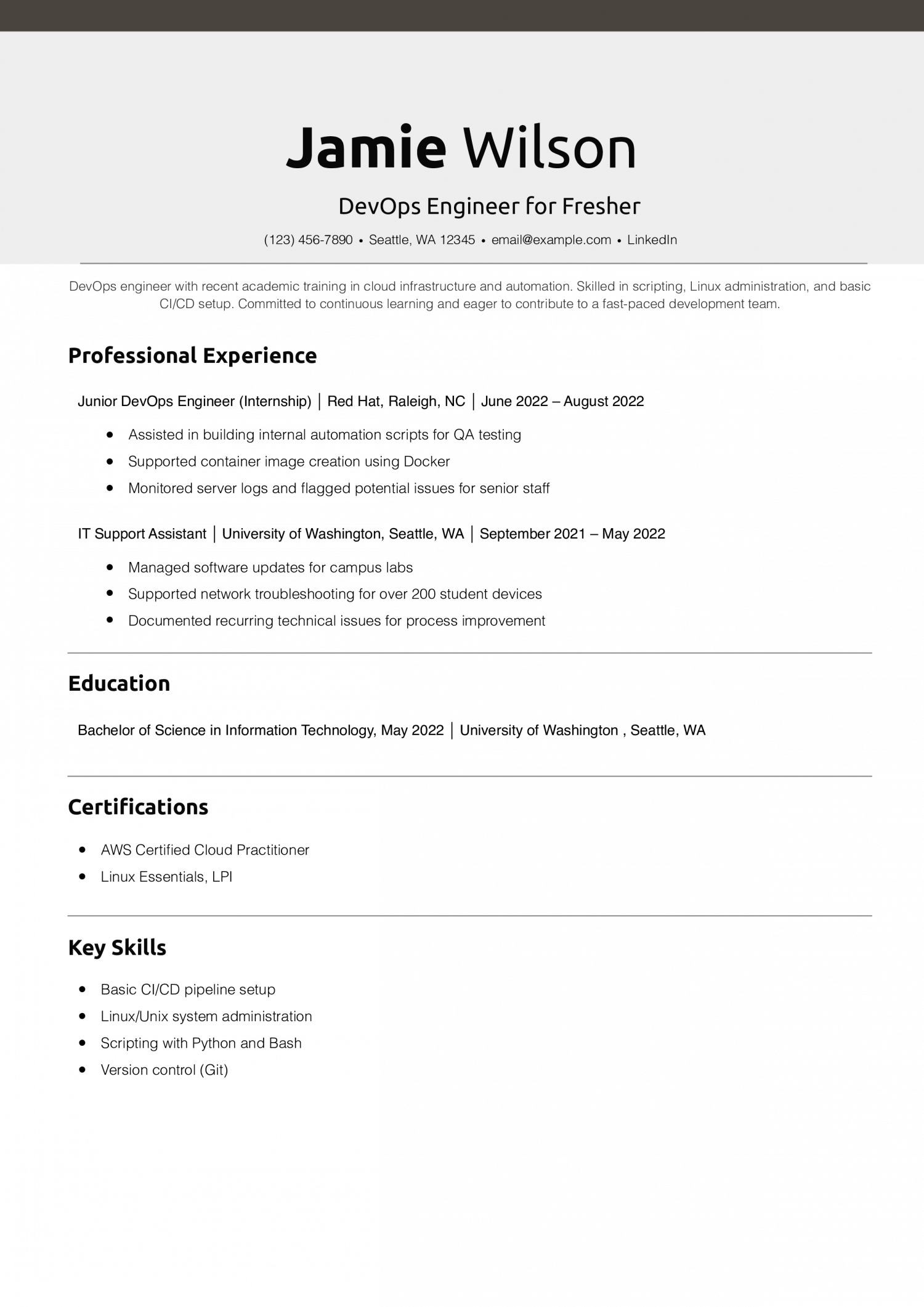
Why this fresher DevOps engineer resume example is strong:
Jamie’s resume emphasizes education, certifications, and relevant internships to compensate for limited experience. This approach works well for new graduates. To get more ideas on showcasing limited experience, visit How To Write a Resume With No Experience.
DevOps Support Engineer Resume Example
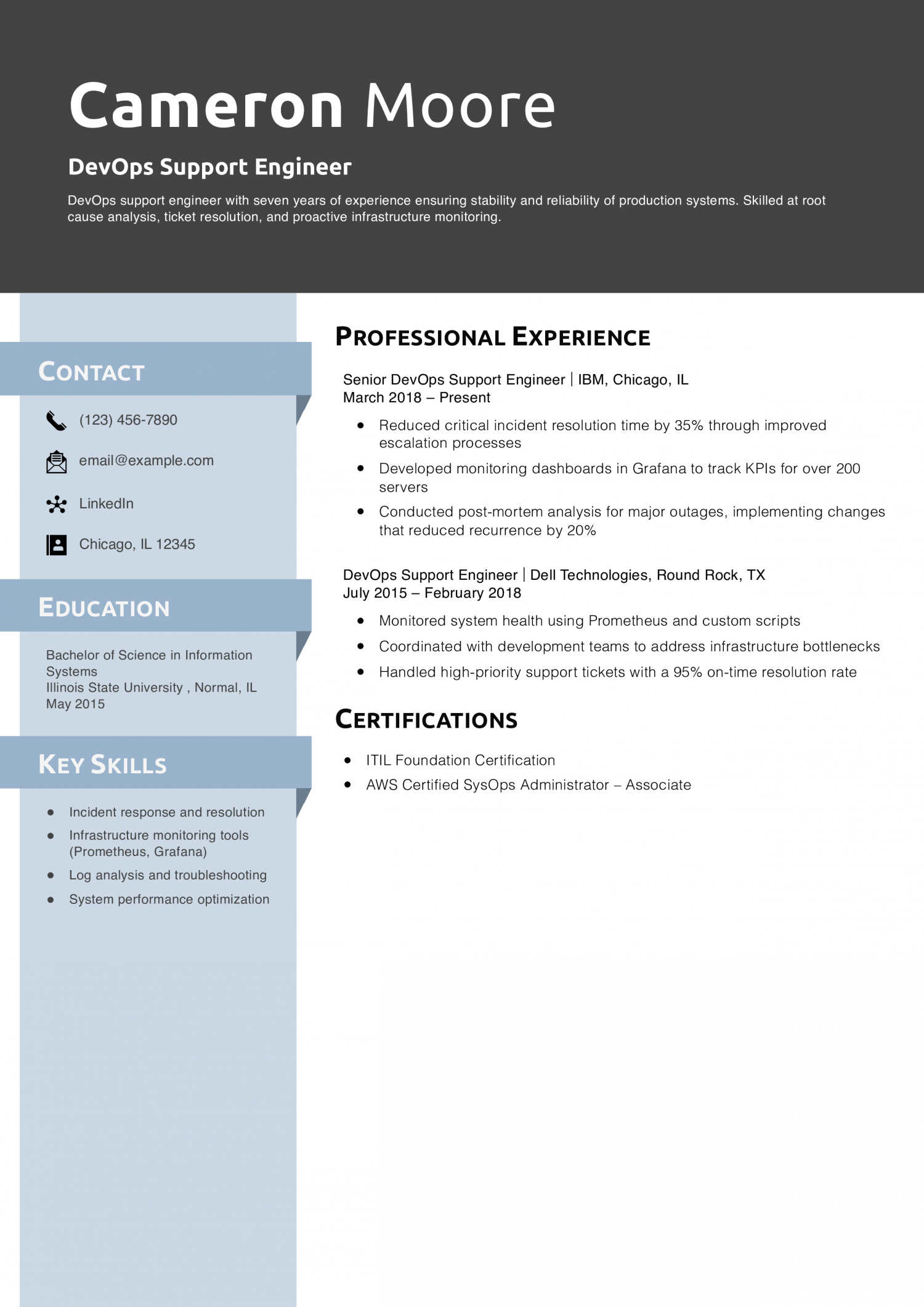
Why this DevOps support engineer resume example is strong:
Cameron’s resume focuses on uptime, reliability, and measurable improvements in response times. This emphasis on operational stability is crucial in support roles. Learn how to tailor your achievements to match job descriptions in How To Tailor Resume to Job Description.
GCP DevOps Engineer Resume Example
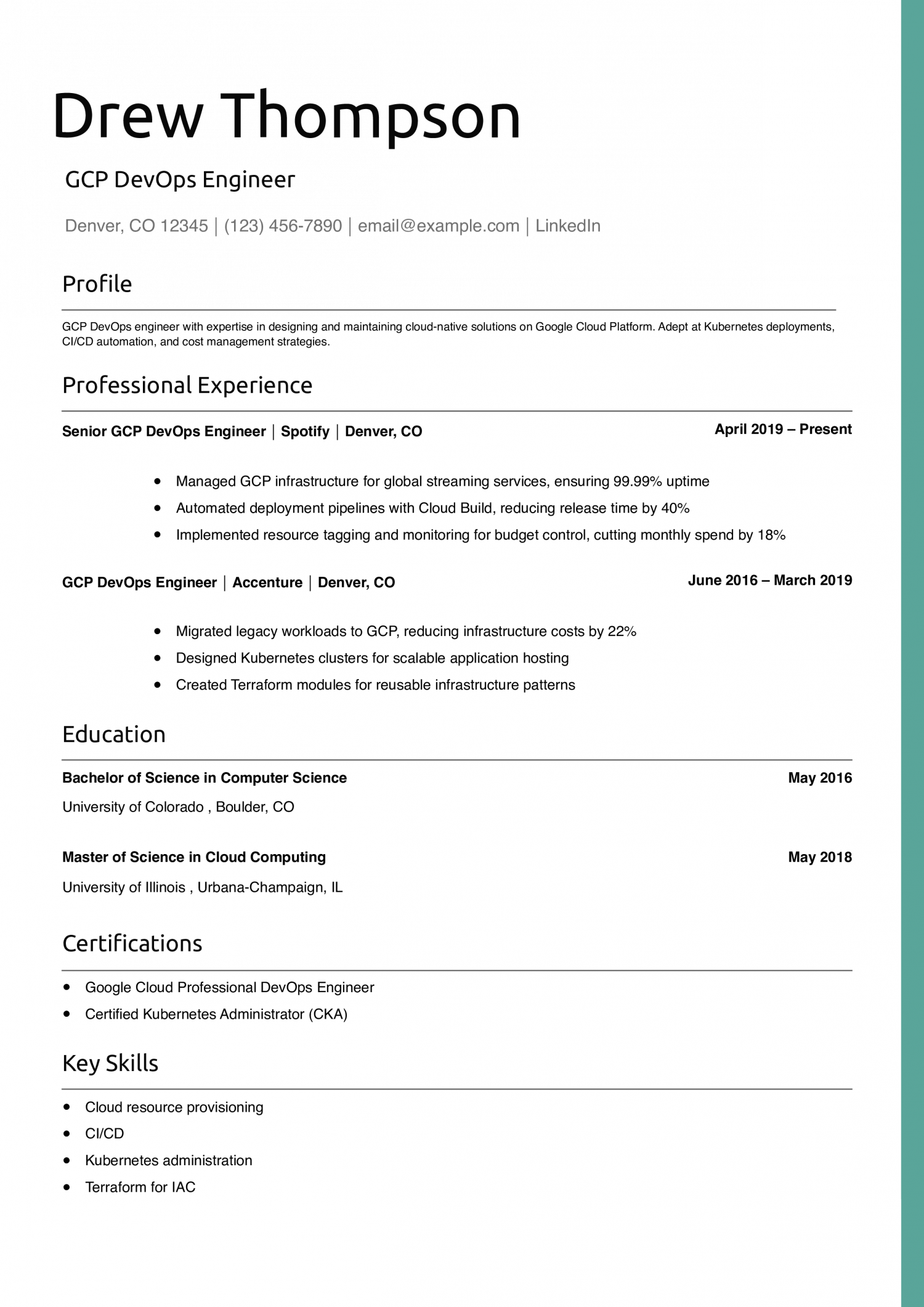
Why this GCP DevOps engineer resume example is strong:
Drew’s resume connects specific Google Cloud skills with cost-saving and efficiency outcomes. Quantifiable results make a strong case for their expertise. For more on presenting certifications effectively, see How To List Certifications on a Resume.
Java DevOps Engineer Resume Example
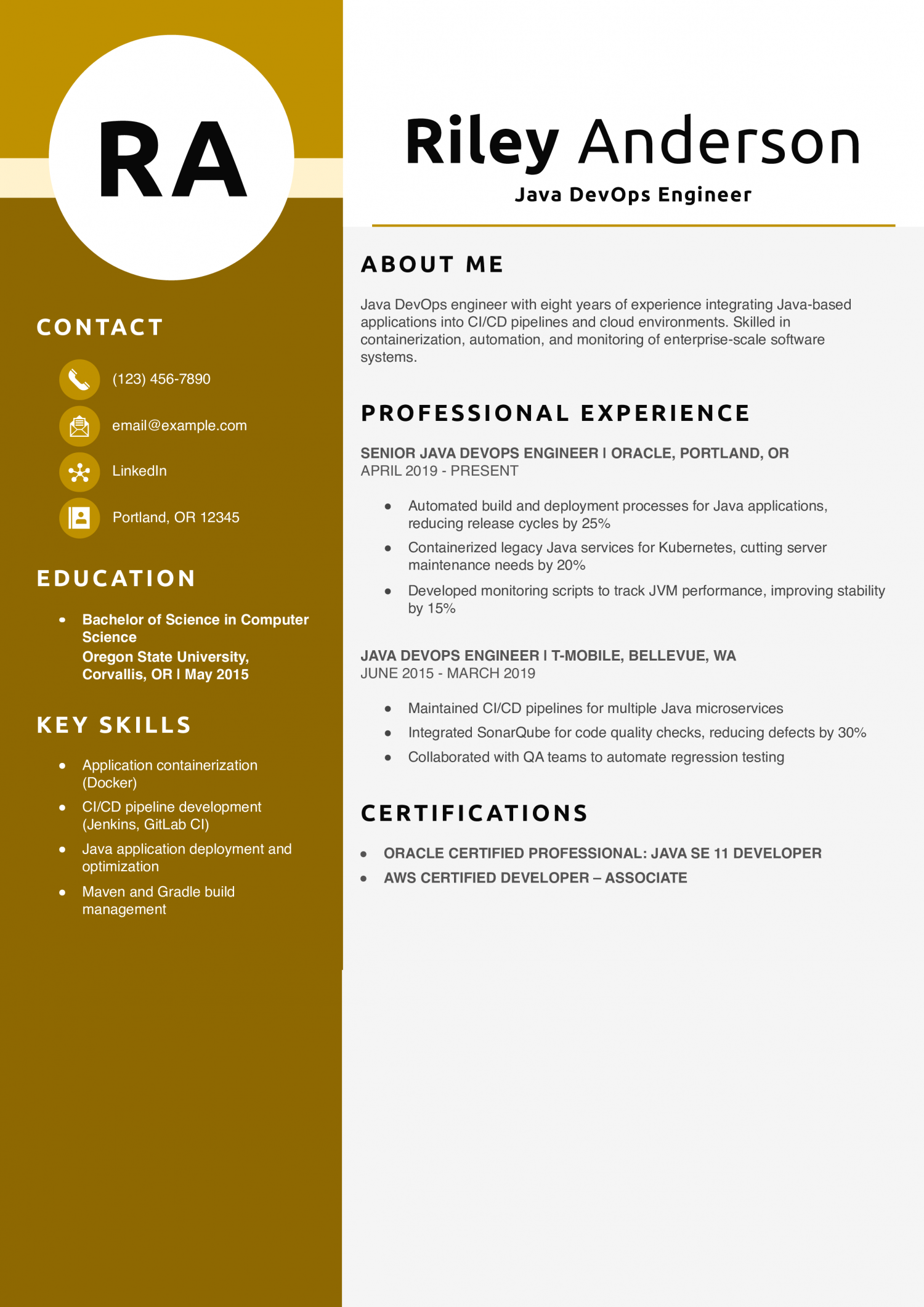
Why this Java DevOps engineer resume example is strong:
Riley’s resume shows direct connections between Java expertise and measurable business benefits like reduced release cycles. Including specific technologies (e.g., Maven, Gradle) demonstrates depth. For tips on what to include in technical resumes, see Technical Skills in IT Resume.
Lead DevOps Engineer Resume Example
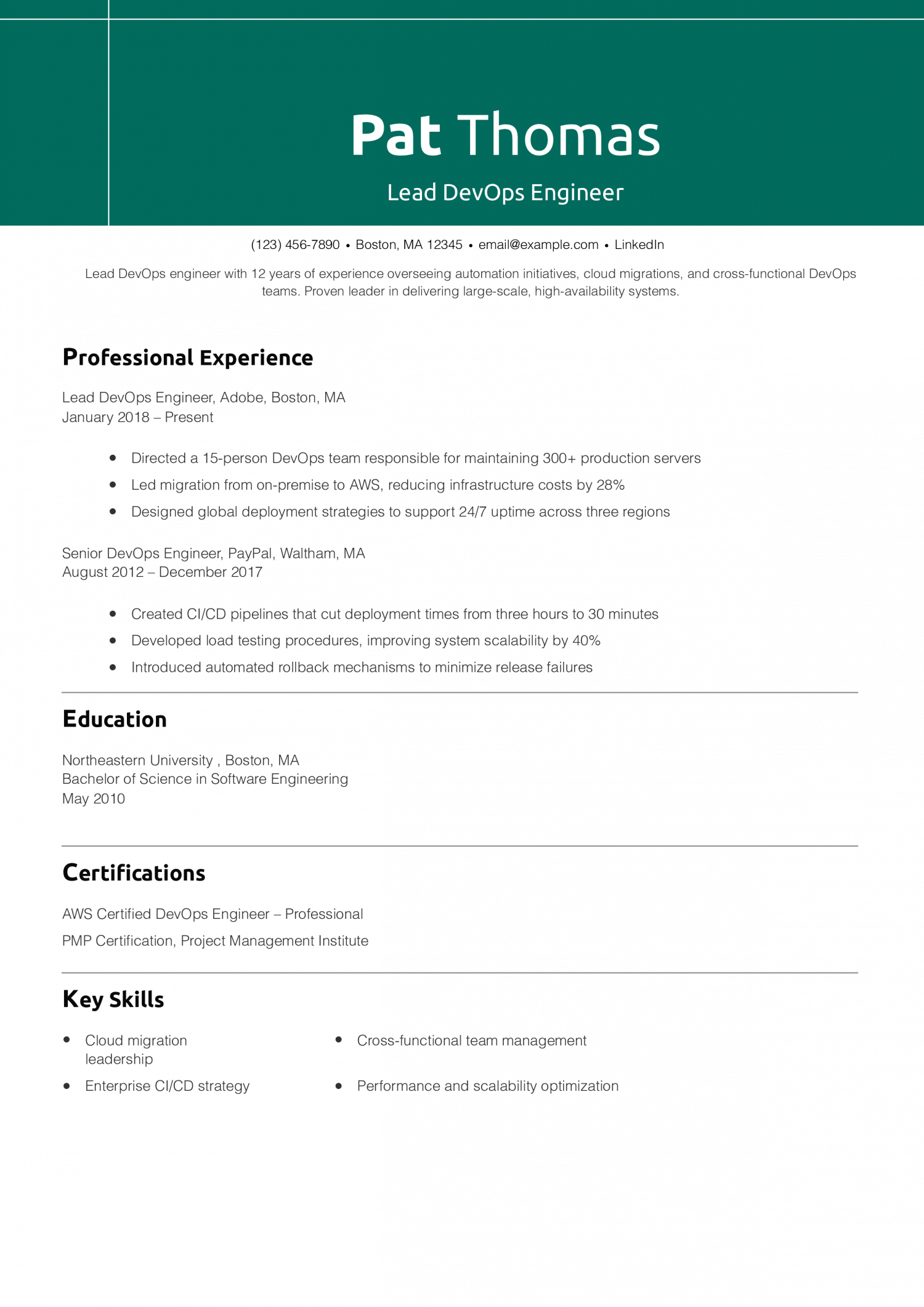
Why this lead DevOps engineer resume example is strong:
Pat’s resume emphasizes leadership responsibilities and technical achievements, which is critical for senior positions. Including team size and budget impact helps showcase management capability. For guidance on structuring leadership resumes, visit Leadership Skills for Resume With Examples.
Kubernetes DevOps Engineer Resume Example
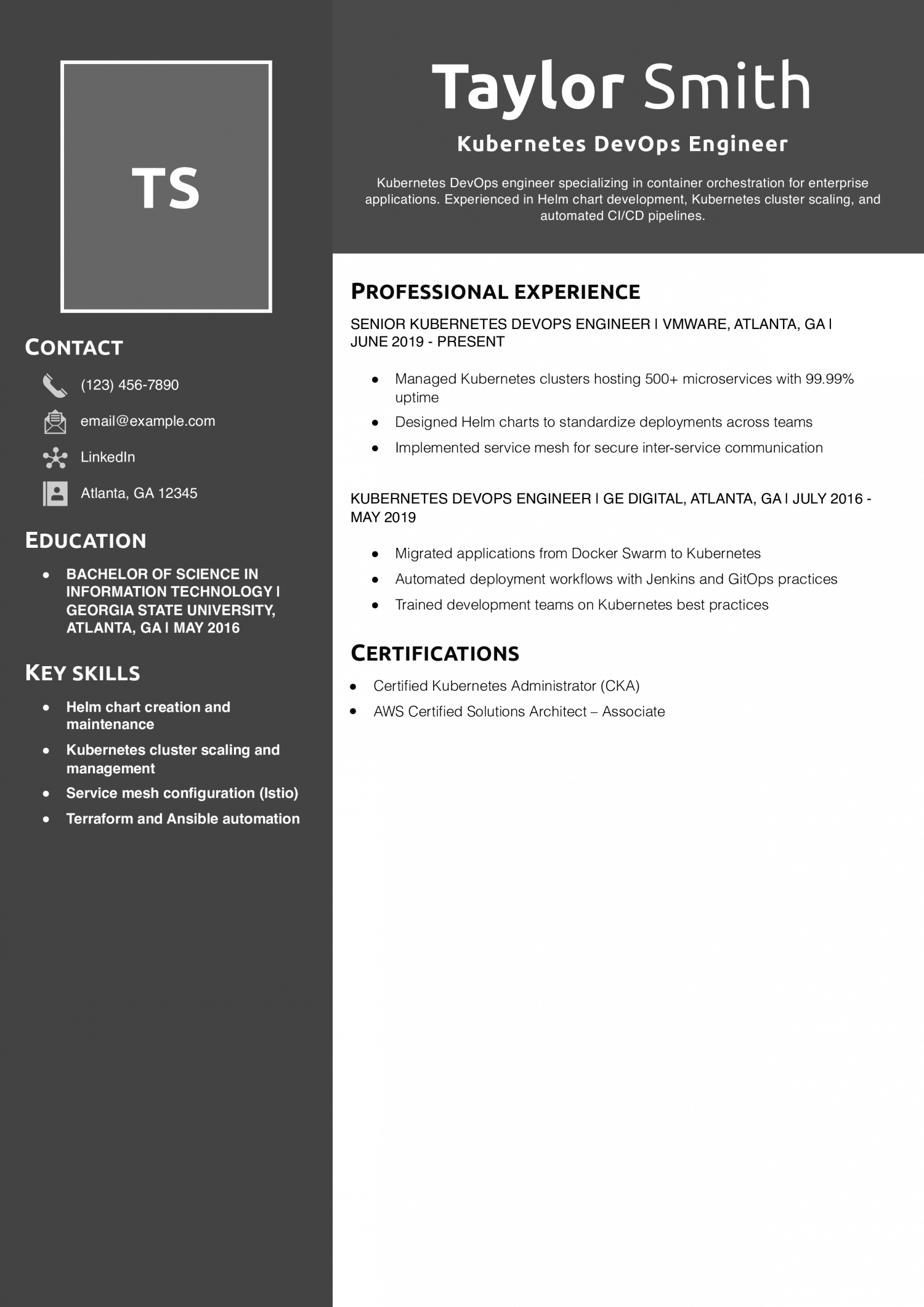
Why this Kubernetes DevOps engineer resume example is strong:
Taylor’s resume demonstrates mastery of Kubernetes and related tools, supported by clear metrics like uptime and cluster size. Including emerging technologies like service mesh highlights adaptability. For more on selecting resume keywords, see Resume Keywords.
Site Reliability Engineer Resume Example
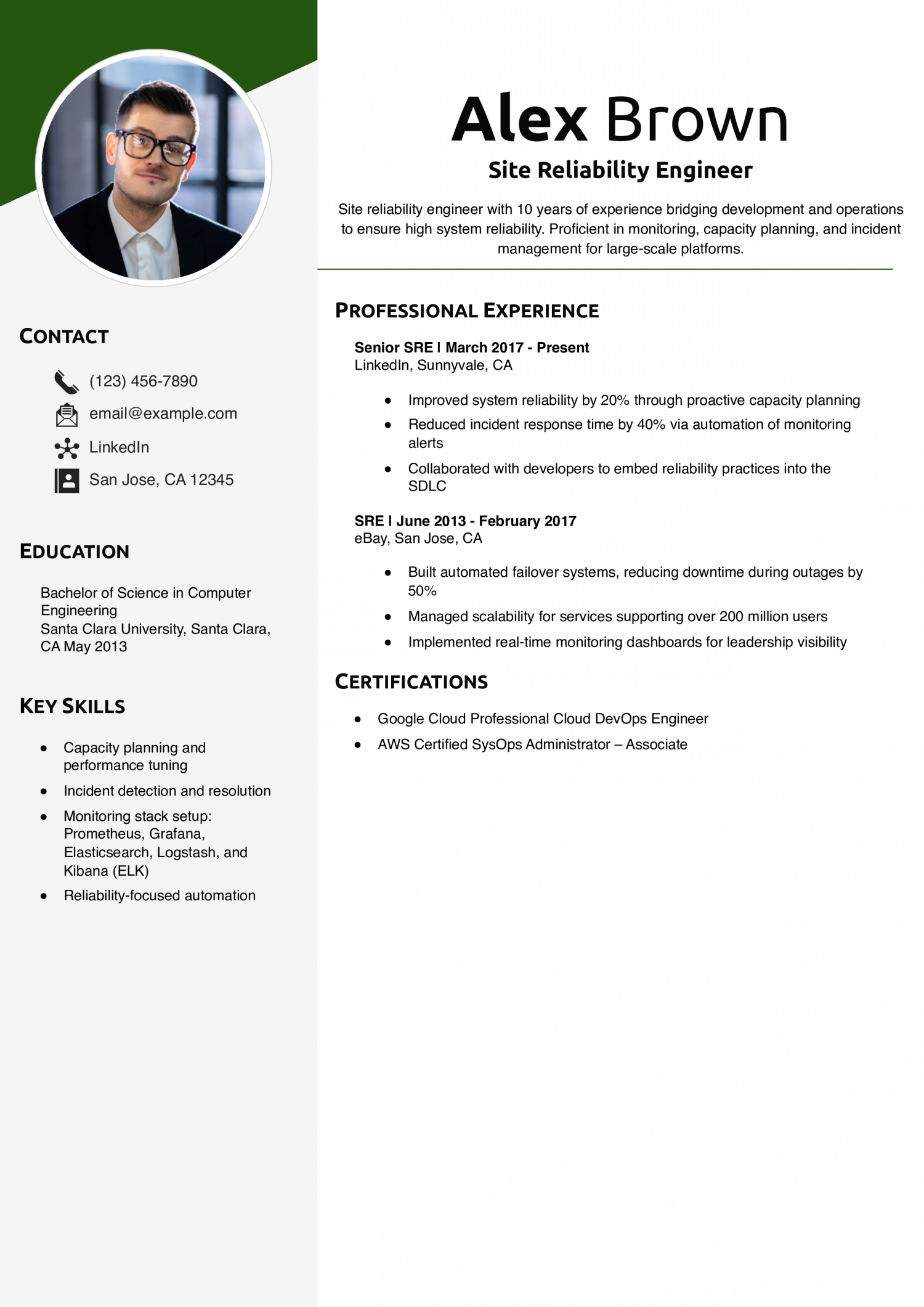
Why this site reliability engineer resume example is strong:
Alex’s resume blends reliability-focused technical skills with measurable operational improvements, which is central to SRE roles. For more strategies on quantifying impact, see Work Experience on a Resume.
Automation DevOps Engineer Resume Example
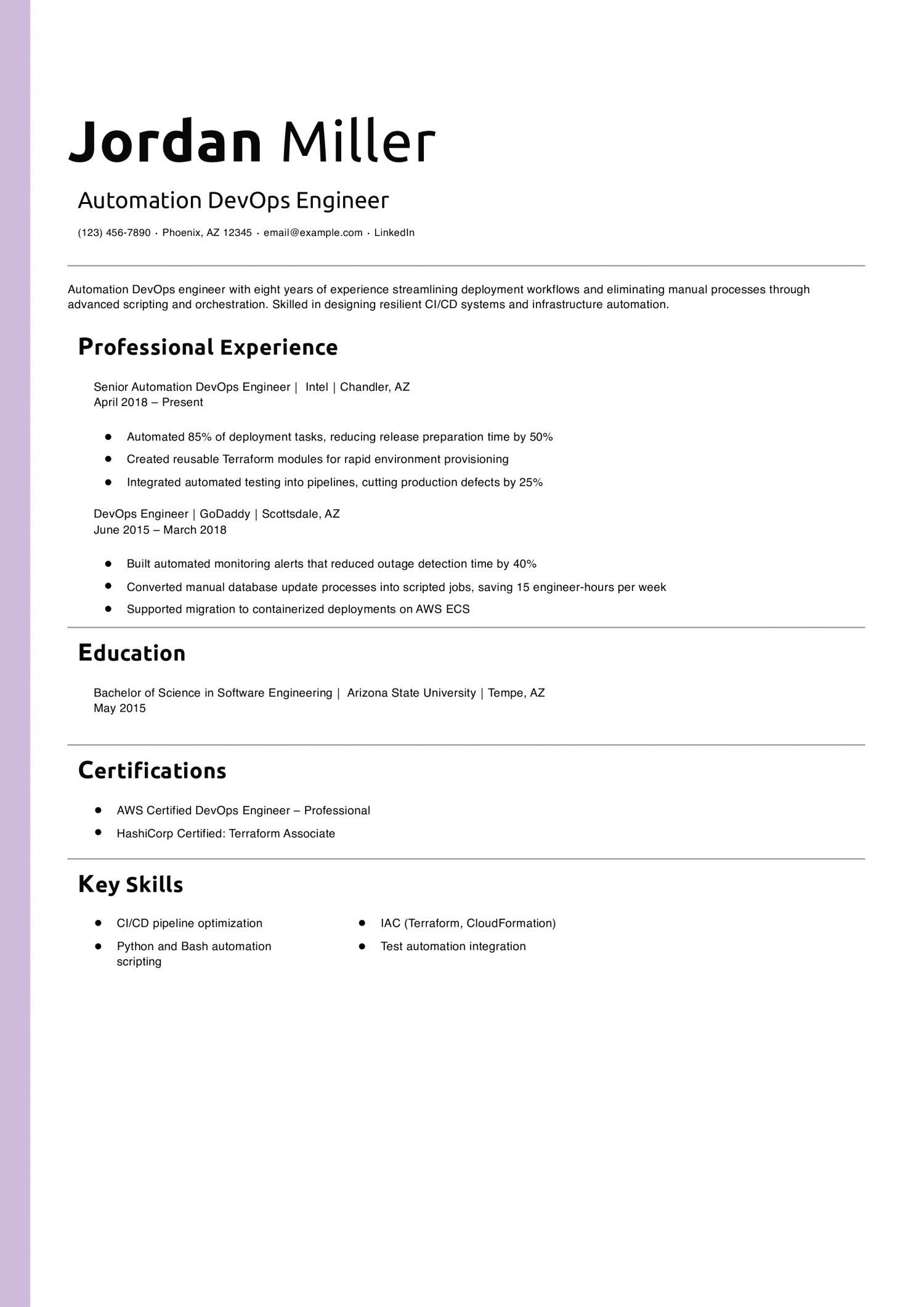
Why this automation DevOps engineer resume example is strong:
Jordan’s resume uses tangible metrics to prove efficiency gains from automation. The focus on scripting and IaC aligns with modern DevOps hiring trends. Learn more about impactful phrasing with Resume Action Words.
Infrastructure DevOps Engineer Resume Example
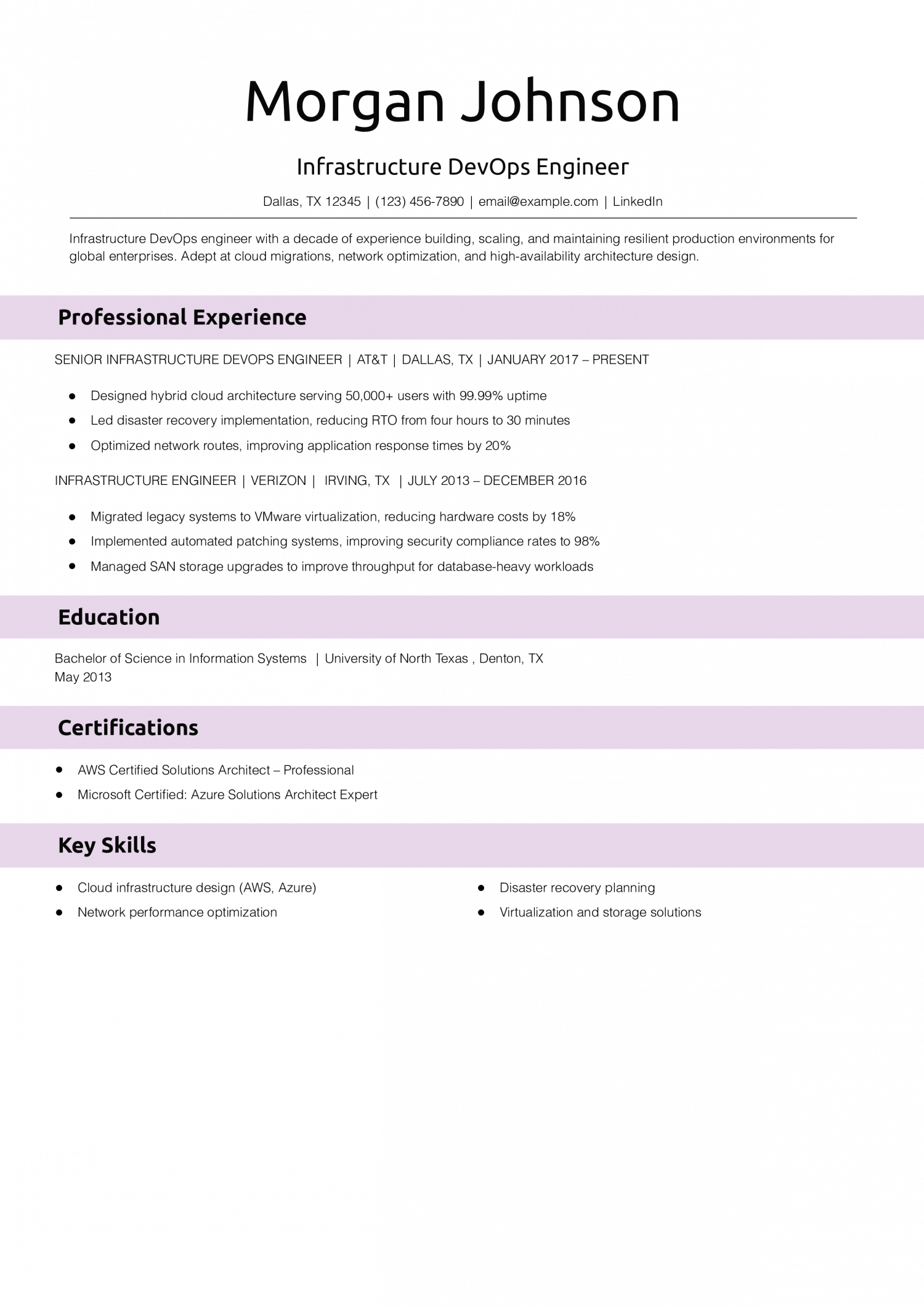
Why this infrastructure DevOps engineer resume example is strong:
Morgan’s resume showcases critical infrastructure projects with quantifiable uptime and recovery improvements. This focus is ideal for infrastructure-heavy DevOps positions. See more formatting strategies in Best Looking Resumes.
Security-Focused DevOps Engineer Resume Example
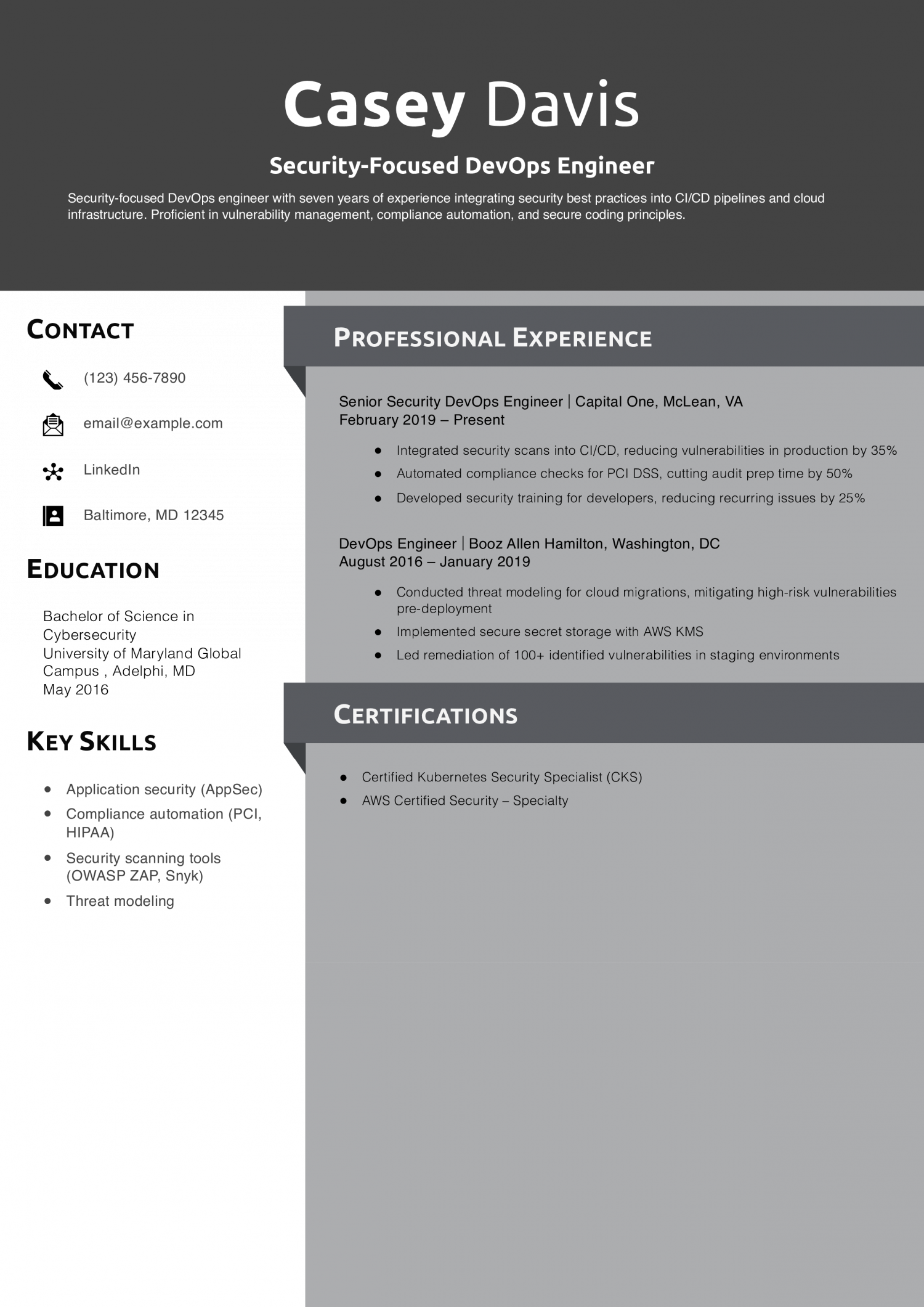
Why this security-focused DevOps engineer resume example is strong:
Casey’s resume directly ties security skills to reduced vulnerabilities and compliance improvements. This approach appeals to organizations prioritizing DevSecOps. For more tips on skill inclusion, see How To List Skills on a Resume.
Database DevOps Engineer Resume Example
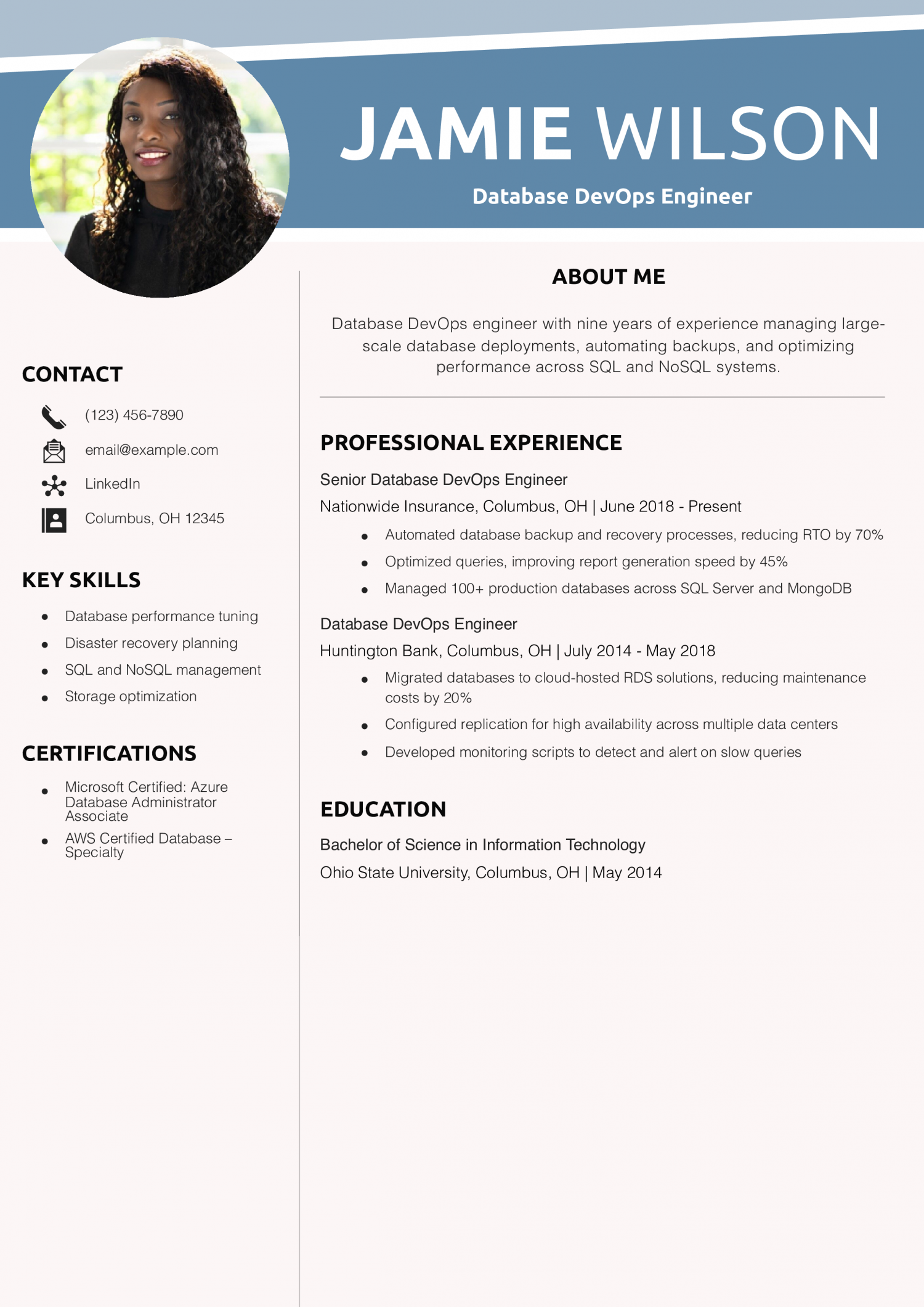
Why this database DevOps engineer resume example is strong:
Jamie’s resume quantifies speed, cost, and disaster recovery improvements — critical metrics for database-heavy environments. Learn how to present similar technical wins in Resume Job Description.
Networking DevOps Engineer Resume Example

Why this networking DevOps engineer resume example is strong:
Cameron’s resume highlights automation and SDN implementation to show adaptability to modern networking demands. For ideas on integrating technical expertise, see Computer Skills for Resume.
Monitoring and Observability DevOps Engineer Resume Example
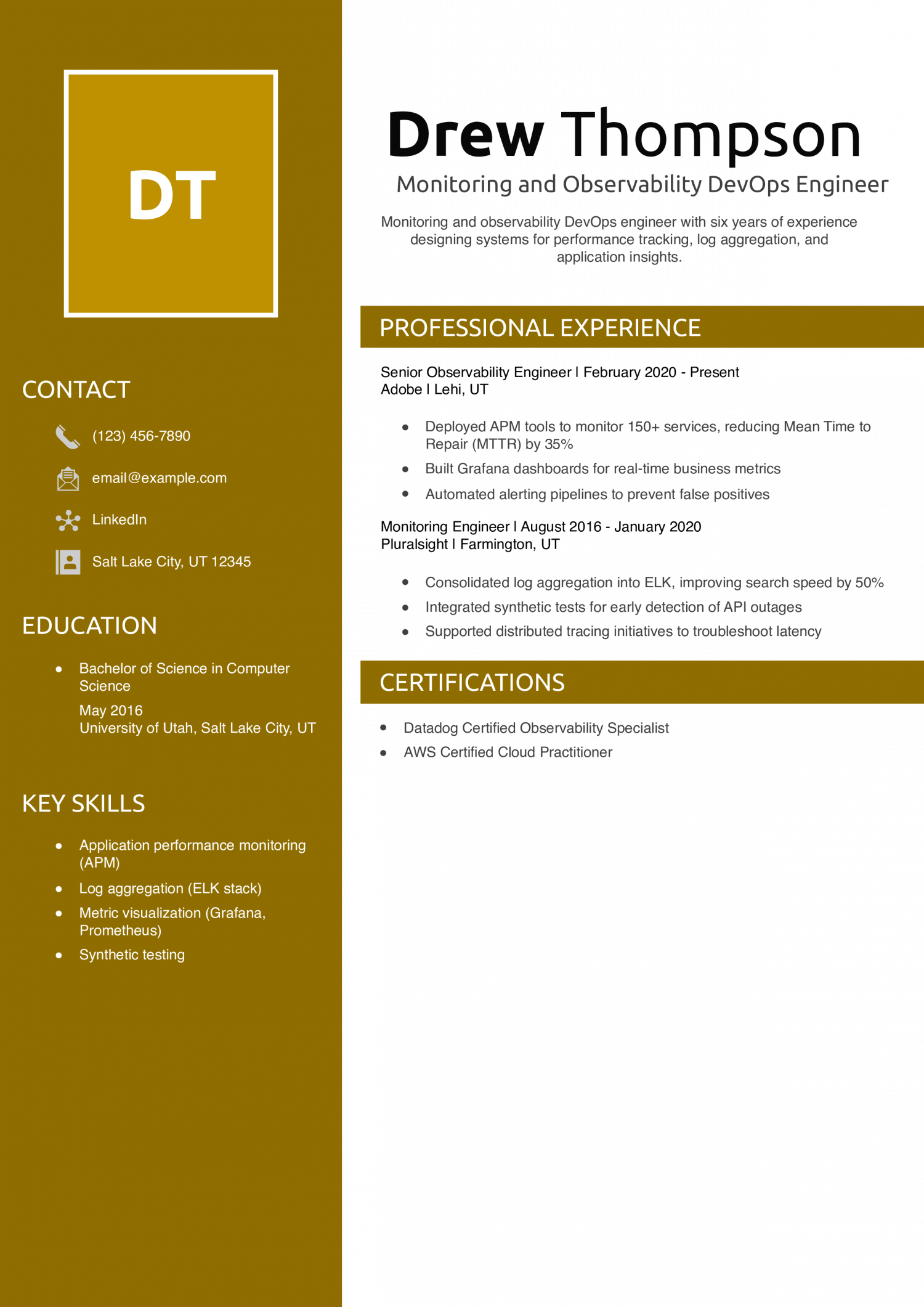
Why this monitoring DevOps engineer resume example is strong:
Drew’s resume showcases expertise in reducing downtime through proactive monitoring, critical in DevOps.
Build and Release DevOps Engineer Resume Example
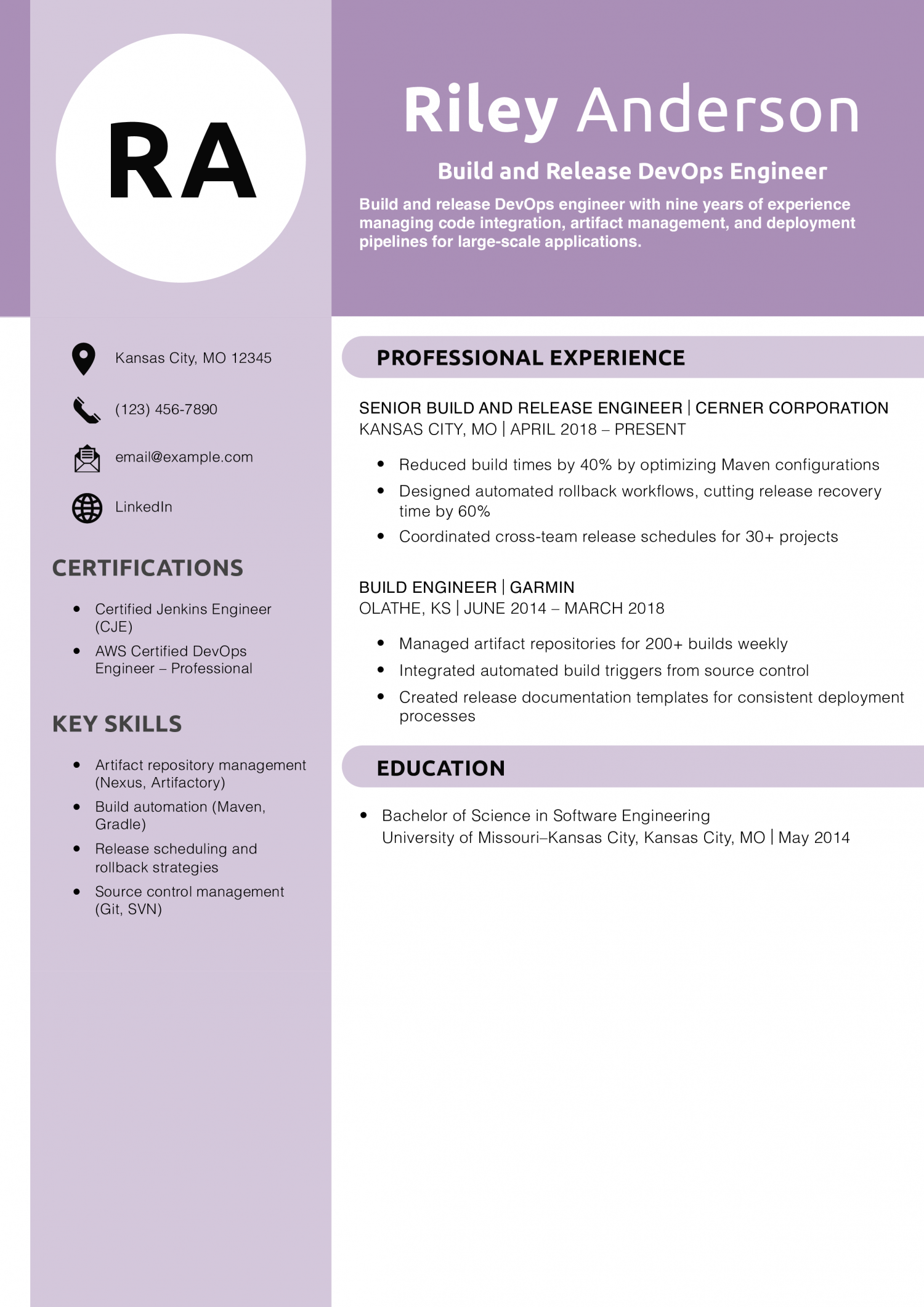
Why this build and release DevOps engineer resume example is strong:
Riley’s resume emphasizes efficiency gains and recovery strategies — key aspects of release engineering. For guidance on build-focused resumes, see Resume Personal Statement Examples.
Cross-Platform DevOps Engineer Resume Example
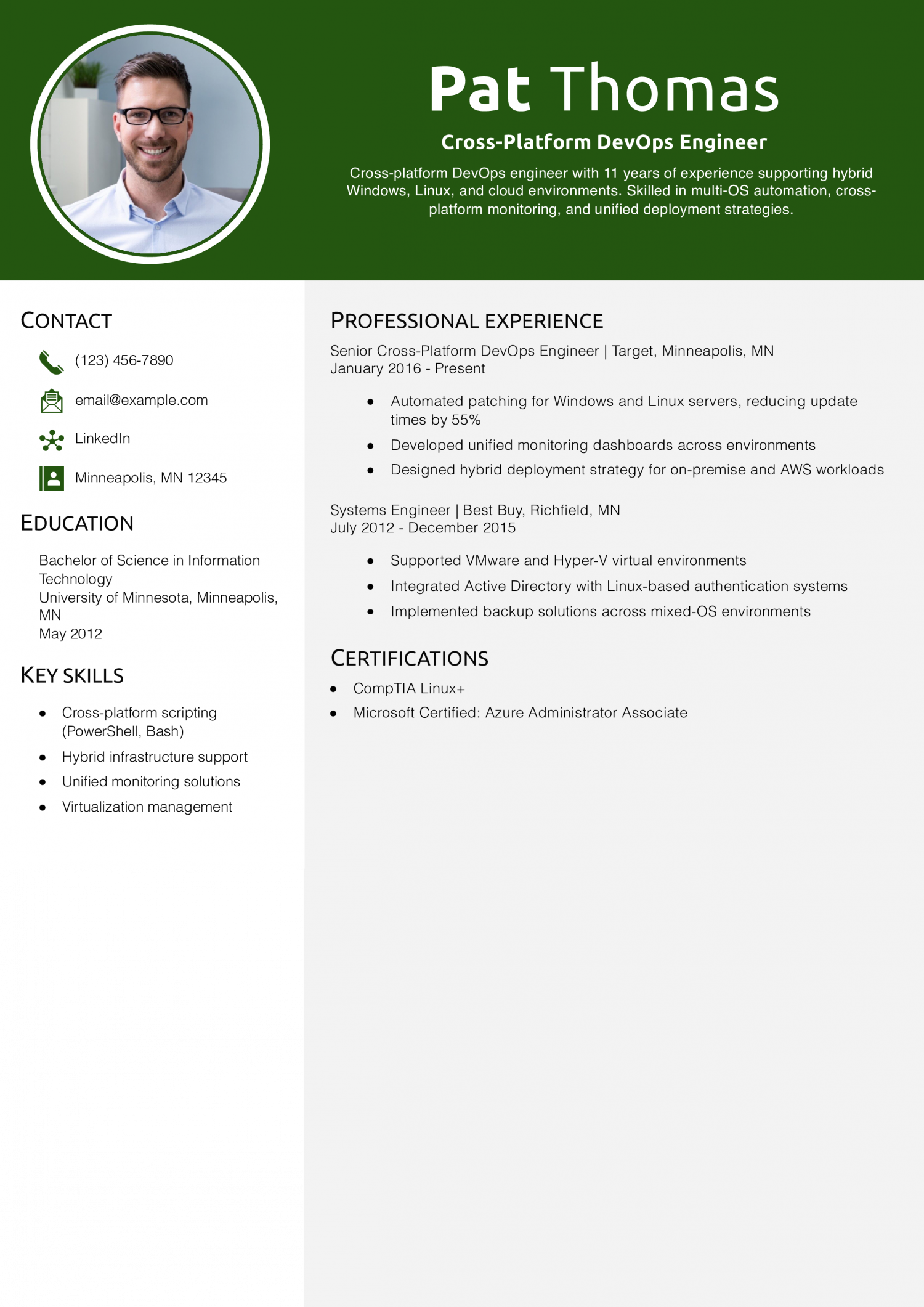
Why this cross-platform DevOps engineer resume example is strong:
Pat’s resume demonstrates flexibility and expertise in managing mixed environments—a valuable skill for companies with diverse tech stacks. See more hybrid environment resume tips in Transferable Skills Resume.
DevOps Engineer Text-Only Resume Examples and Templates
How To Write a DevOps Engineer Resume
Using a template can help you write an effective DevOps engineer resume. Your DevOps engineer resume should usually include these sections:
- Contact information
- Profile
- Key skills
- Professional experience
- Education and certifications
Before starting work on your resume, jot down your preferences for your target job duties, industry, company size, or work culture. These notes help you determine and emphasize your best career details as you draft each section.
1. Share your contact information
Give your full name, phone number, email address, location, and links to any online professional profiles. Ensure your current contact information so employers can reach you for an interview.
Example
Your Name
(123) 456-7890 | [email protected] | City, State Abbreviation Zip Code | LinkedIn
2. Summarize your DevOps engineer qualifications in a dynamic profile
Impress hiring managers at the top of your resume by giving the three to five primary reasons you can excel as their next DevOps engineer. These key selling points may include your:
- Years of related work experience
- Work style or approach (efficient, diligent, collaborative…)
- College degree(s) or certifications in your field
Example
DevOps engineer with a strong education from prestigious institutions and extensive experience at tech giants like Google and Microsoft. Skilled at implementing automation, managing information technology (IT) infrastructure, and facilitating communication between development and operations teams. Certified in Amazon Web Services (AWS), Jenkins, and Docker, with a deep understanding of scripting languages, Continuous Integration (CI)/Continuous Deployment (CD) tools, cloud platforms, and containerization technologies.
3. Add your DevOps engineer experience with compelling examples
View the experience section as a chance to give examples of your work and success in roles similar to the one you’re pursuing. For each job in your recent work history, brainstorm your duties and achievements on a separate document or sheet of paper. Then, choose the most relevant details to feature as bullet points in this section.
Example
Senior Azure DevOps Engineer, IBM, New York, NY | June 2017 to present
- Implemented and managed continuous delivery systems and methodologies on Azure, reducing software delivery process time by 30%
- Managed and provisioned the infrastructure on Azure cloud platform, including setting up virtual machines, managing storage, and configuring networks, for over 50 projects
- Monitored system performance, identified issues, and implemented solutions using Azure’s monitoring tools, improving system efficiency by 20%
Resume writer's tip: Quantify your experience
Use relevant performance data and metrics to show the results you’ve achieved as a DevOps engineer when possible. Hard numbers put your work in context and give recruiters a better sense of your scope and impact.
Resume writer's tip: Tailor your resume to each application
For each job posting you respond to, note any details about the hiring organization’s size, industry, customer base, or products and services. How do these areas compare to your recent experience? You can make a stronger first impression on the hiring manager by citing these similarities in your profile.
For instance, say the company is in manufacturing. You could enhance your profile by changing your first line from “Manager with seven years of experience” to “Manager with seven years of experience, including three years in manufacturing.”
What if you need to gain experience as a DevOps engineer?
Don’t worry. As long as the job posting doesn’t strictly require it, you don’t need direct work experience to write an effective resume. The trick is focusing on your transferable skills, which can come from various areas such as your past jobs, internships, volunteer positions, or college courses. By detailing these areas in full on your resume, you can ensure it helps you get interviews for your target job.
4. Include DevOps engineer-related education and certifications
With the education and certifications sections, you can show you have a strong knowledge base in your field. Cite any credentials you’ve earned that speak to your abilities as a DevOps engineer. The following templates help you organize this information in your resume (note that years are optional).
Education
Template:
[Degree Name], [School Name], [City, State Abbreviation] | [Graduation Year]
[Relevant coursework or honors]
Example:
Bachelor of Engineering in Software Engineering, University of California, Berkeley, CA
Certifications
Template:
[Certification Name], [Awarding Organization] | [Completion Year]
Example:
Docker Certified Associate (DCA), Docker Inc.
5. Include a list of skills and proficiencies related to DevOps engineer
A skills section lets you quickly display how to serve clients or add value to an organization. Below, you’ll find some key terms and skills to consider for this section:
| Key Skills and Proficiencies | |
|---|---|
| Agile methodologies | AWS cloud services |
| Azure DevOps and Azure Cloud Services | Configuration management tools (Chef, Puppet, Ansible) |
| Containerization technologies | Continuous delivery systems |
| Cross-functional collaboration | DevOps methodologies |
| Infrastructure as code (IAC) tools | Infrastructure management |
| Linux/Unix administration | Process automation |
| Scripting languages (Python, Perl, Ruby) | |
Resume writer's tip: Use common action verbs
One of the best ways to enhance your resume is by starting each bullet point with a strong action verb. Dynamic verbs help you keep the hiring manager’s attention and show the varied nature of your experience.
Do
- "Managed and motivated a 12-person team "
Don’t
- "Responsibilities included management of a 12-person team "
The following list can help you find a good mix of action verbs for your DevOps engineer resume:
| Action Verbs | |
|---|---|
| Configured | Created |
| Decreased | Designed |
| Enhanced | Established |
| Fostered | Generated |
| Grew | Improved |
| Increased | Introduced |
| Lowered | Managed |
| Prevented | Ranked |
| Reduced | Streamlined |
| Updated | Won |
How To Pick the Best DevOps Engineer Resume Template
A resume is a simple tool for professional communication and should be formatted accordingly. Choose a clear and straightforward template, and avoid any template with elaborate graphics or various colors and font styles. Simple resume design helps a hiring manager scan for relevant information. It also enables you to tailor the document to each job application and update your work history.
Frequently Asked Questions: DevOps Engineer Resume Examples and Advice
Adapting a DevOps Engineer resume example to your career journey means focusing on how your skills and responsibilities have evolved over time. Be sure to include specific milestones that show how your role has changed and your growing expertise. If you're applying for a more senior role, highlight leadership positions, advanced skills, and any industry-specific certifications that support your qualifications.
First, look closely at the job post text and note repeated or emphasized words. Compare these phrases to the language you're using in your resume, particularly the profile and key skills sections. Then, seek ways to align your resume language with the job posting while not copying phrases or misstating your background.
For example, if the organization seeks someone collaborative, call out that aspect of your experience in your profile. Or say the company has many non-English speaking customers. Cite your foreign language skills in your profile and as a separate section farther down the document. With adjustments like these, you can make your resume more relevant to each opportunity.
Most DevOps engineers should use the combination (or hybrid) format. True to its name, this format combines two essential features of other resume formats: the chronological format's experience section and the functional format's profile section. (The resume examples on this page all use combination format.)
A combination resume offers the best of both worlds by fusing these features. The experience section lets you outline your recent work history - essential information for most employers. At the same time, the profile section enables you to display your career highlights at the top, whether they're from that work history or another part of your background.
As a result, you can present yourself clearly and strategically. This format gives hiring managers the best view of your experience and relevant strengths so they can decide whether to call you for an interview.
Include a cover letter with your resume
A good cover letter can enhance your job application. To write a standout letter, get specific. Tell the hiring manager why you’re interested in their organization and the DevOps engineer role they hope to fill.
Check Out Related Examples
Resume Templates offers HR approved resume templates to help you create a professional resume in minutes. Choose from several template options and even pre-populate a resume from your profile.

